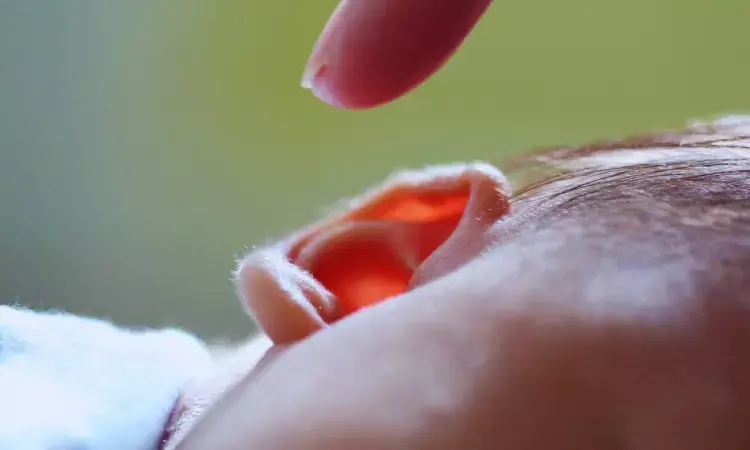- Home
- Medical news & Guidelines
- Anesthesiology
- Cardiology and CTVS
- Critical Care
- Dentistry
- Dermatology
- Diabetes and Endocrinology
- ENT
- Gastroenterology
- Medicine
- Nephrology
- Neurology
- Obstretics-Gynaecology
- Oncology
- Ophthalmology
- Orthopaedics
- Pediatrics-Neonatology
- Psychiatry
- Pulmonology
- Radiology
- Surgery
- Urology
- Laboratory Medicine
- Diet
- Nursing
- Paramedical
- Physiotherapy
- Health news
- Fact Check
- Bone Health Fact Check
- Brain Health Fact Check
- Cancer Related Fact Check
- Child Care Fact Check
- Dental and oral health fact check
- Diabetes and metabolic health fact check
- Diet and Nutrition Fact Check
- Eye and ENT Care Fact Check
- Fitness fact check
- Gut health fact check
- Heart health fact check
- Kidney health fact check
- Medical education fact check
- Men's health fact check
- Respiratory fact check
- Skin and hair care fact check
- Vaccine and Immunization fact check
- Women's health fact check
- AYUSH
- State News
- Andaman and Nicobar Islands
- Andhra Pradesh
- Arunachal Pradesh
- Assam
- Bihar
- Chandigarh
- Chattisgarh
- Dadra and Nagar Haveli
- Daman and Diu
- Delhi
- Goa
- Gujarat
- Haryana
- Himachal Pradesh
- Jammu & Kashmir
- Jharkhand
- Karnataka
- Kerala
- Ladakh
- Lakshadweep
- Madhya Pradesh
- Maharashtra
- Manipur
- Meghalaya
- Mizoram
- Nagaland
- Odisha
- Puducherry
- Punjab
- Rajasthan
- Sikkim
- Tamil Nadu
- Telangana
- Tripura
- Uttar Pradesh
- Uttrakhand
- West Bengal
- Medical Education
- Industry
Hearing assessment during infancy can predict neurophysiological development at 12 months

Portuguese researchers have proven that hearing assessment in early-age infants can help predict milestones and early detection of neurodevelopmental disorder markers.
Several studies suggest that the brain's response to different auditory stimulus intensities in newborn babies can provide important information about basic auditory sensory processing skills, with cascading effects on aspects such as behavioral organization, social involvement and, consequently, language competencies (Benasich & Tallal, 2002; Benasich et al., 2002; Cruz et al., 2018; Kushnerenko, Tomalski, Ballieux, Potton, et al., 2013; Kushnerenko, Tomalski, Ballieux, Ribeiro, et al., 2013; Marcoux, 2011).
It was from this state of the art that the researchers Sara Cruz, Alberto Crego, Carla Moreira, Eugénia Ribeiro, Óscar Gonçalves, Rita Ramos and Adriana Sampaio started the study that gave rise to the paper "Cortical auditory evoked potentials in 1-month-old infants predict language outcomes at 12 months", published in January 2022 in the journal Infancy.
Eighteen mother-infant dyads recruited at birth participated in the study, all babies meeting the criteria of being born full-term, weight >2500 g, Apgar score of 9/10 in the 10th minute, and having passed the medical hearing test. Infants were assessed at two different times: at one month and at 12 months of age.
In the paper, the researchers explain that, using electrodes, they recorded the CAEP-Cortical Auditory Evoked Potentials, that is, a series of waves generated in the auditory cortex in response to sound, to examine the components called P2 and N2 for two auditory stimuli intensities in one-month-old infants. Then, they sought to correlate the CAEP response to both auditory stimuli with neurobehavioral competencies, since infants' reactivity to external (social interaction characteristics) and internal (self-regulatory skills) stimuli has been associated with social-type behavior (Brazelton & Nugent, 1995; Cruz et al., 2015).
Finally, the team of researchers led by the University of Minho sought to prove whether the neurophysiological response recorded in one-month-old babies predicted developmental outcomes at 12 months. "As far as we Know, no other study has addressed these questions using a neurophysiological approach in responses to different intensities of auditory stimuli and developmental assessment " says Adriana Sampaio, a researcher supported by the BIAL Foundation.
"In this study, we proved that CAEP in one-month-old infants are related to interactive behavior and self-regulatory abilities and, in 12-month-old infants, with language competencies", reveals the researcher from the School of Psychology at the University of Minho.
The results obtained were consistent with previous studies that indicate an association between auditory processing and developmental outcomes in infants, which may be crucial for the early detection of neurodevelopmental disorders in children.
Reference:
Cruz, S., Crego, A., Moreira, C., Ribeiro, E., Gonçalves, Ó., Ramos, R., & Sampaio, A. (2022). Cortical auditory evoked potentials in 1-month-old infants predict language outcomes at 12 months. Infancy, 27, 324– 340.https://doi.org/10.1111/infa.12454
Dr Kamal Kant Kohli-MBBS, DTCD- a chest specialist with more than 30 years of practice and a flair for writing clinical articles, Dr Kamal Kant Kohli joined Medical Dialogues as a Chief Editor of Medical News. Besides writing articles, as an editor, he proofreads and verifies all the medical content published on Medical Dialogues including those coming from journals, studies,medical conferences,guidelines etc. Email: drkohli@medicaldialogues.in. Contact no. 011-43720751


